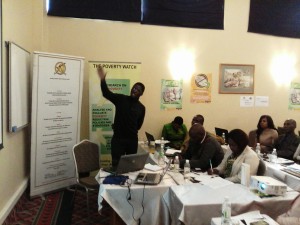CSOS CRITIQUE I-PRSP FOR ZIMBABWE
http://spiked.co.zw/?p=1785CSOs Critique I-PRSP For Zimbabwe
Byron Mutingwende
The civil society organisations (CSOs) have added their expectations in the Poverty Reduction Strategy Papers (PRSPs) which seek to enhance domestic accountability for poverty reduction reform efforts.
Presenting a paper at the Poverty Reduction Forum Trust PRSP CSOs Consultation Day, Tirivangani Mutazu the Senior Policy Analyst at the African Forum and Network on Debt and Development (AFRODAD), said that a PRSP sets out a country’s macroeconomic, structural, and social policies and programs to promote growth and reduce poverty, as well as associated external financing needs.
“Countries will typically prepare a PRSP every three to five years in a participatory process involving a broad range of stakeholders. A PRSP will describe the format, frequency, and location of consultations; a summary of the main issues raised and the views of participants; an account of the impact of the consultations on the design of the strategy; and a discussion of the role of civil society in future monitoring and implementation,” Mutazu said.
For Zimbabwe’s I-PRSP, Mutazu bemoaned the fact that the process was fast-tracked and government controlled and structured. He argued that the draft was not developed through a broad-based participatory process in the country.
“Experienced civil society organisations in labour, agriculture, gender, debt and development, trade, private sector and mining sectors missed out. They were not given enough space to submit their independent contributions to foster transparency and accountability.
“The experience in the formulation and implementation of PRSP process in many other African countries has revealed the lack of representativeness, poor level and quality of Government led consultations are key concerns in the design of the PRSPs and Zimbabwe’s PRSP must not be implemented without capitalising on lessons learnt going forward.”
It was noted that through the CSO-driven consultation process, civil society organisations would be well coordinated and informed to foster accountable, representative and effective PRSP process. Through the development of CSOs position papers, it will be important to influence the Government led processes.
In his recommendation, Mutazu said it was important for the Zimbabwe government to open up spaces for civil society’s effective participation. In that regard, there was the need to put in place an enabling environment and institutional framework for participation.
This should be coupled with capacity building for effective participation – both for government at its different levels, ward, district, province and national – and for CSOs.
All aspects of PRSPs must be opened up for dialogue if they are to be country-driven and nationally owned especially the macroeconomic framework. Civil society should build and strengthen structures for participation through economic literacy, research, and advocacy.
David Damiyano, a researcher, and lecturer at the Bindura University of Science Education said that I-PRSP connects to the Sustainable Development Goals (SDG), 2015-2030 which comprises of 17 goals of which Zimbabwe has prioritized 10 goals. These 10 fall mainly in the category of food security; better health facility; better education and sustainable economic growth.
He said that for the I-PRSP to work effectively, a best practice approach would be the creation of an export-oriented trade policy that can be adopted drawing lessons from regional peers such as Mauritius and supplementing successful measures adopted by other Fragile states with special recognition to the Rwanda magic.
NEPAD and the World Bank in its Africa Action Plan presented the importance of shared growth through private sector promotion, exports, and infrastructure investments (WB, 2005) in order to execute a successful PRS.
The model of Mauritius is one that exemplifies that trade can reduce poverty through the implementation of sustainable policies that support diversity and value added services. Such a policy ensures higher price premiums on value-added manufactures, as demonstrated by the evolution of the clothing and textiles industry in Mauritius and its economy-wide attendant benefits.
On the other hand, trade openness should be balanced against the need to grow local capacity so as to limit future outflows of foreign currency and hence build some measure of self-reliance.
In addition, the best model by I-PRSP should work hand in hand with the G33 proposal which removes WTO obstacles to food security by updating international reference price which might make any administered price today seem like a massive subsidy.
In her analysis of the I-PRSP, Naome Chakanya, a Senior Researcher at the Labour and Economic Development Research Institute of Zimbabwe (LEDRIZ) called for the establishment of strategies such as fiscal discipline, public sector administration, a conducive business environment and foreign direct investment.
“As highlighted in the 2015 Budget Statement, the main areas in need of reforms to ease doing business and attracting FDI include licencing processes; multiplicity of levies; multiplicity of authorities; and delays in utility connections
“Given the political economy context of reforms, ‘doing business reforms’ should be placed on the agenda of the Tripartite Negotiating Forum (TNF) to ensure they are broad-based and are driven through a consultative, inclusive process as opposed to the prevailing situation whereby they are government-based, characterized by inconsistencies,” Chakanya said.





